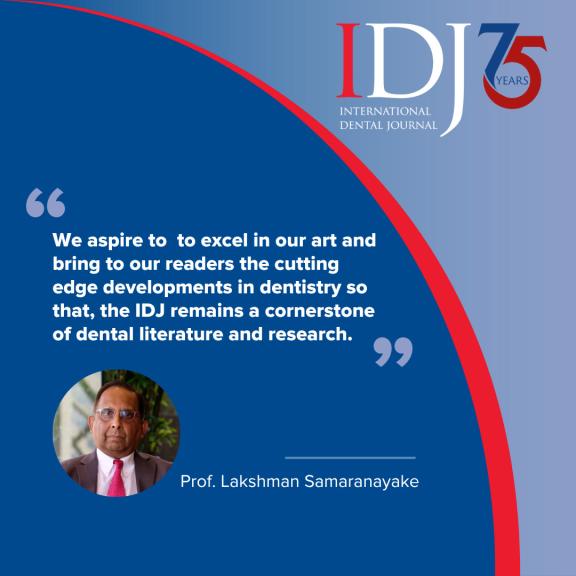Celebrating 75 years of research and knowledge with the International Dental Journal
This year, FDI’s flagship scientific journal, the International Dental Journal (IDJ), marks its 75th anniversary. To celebrate this occasion, FDI interviewed its current Editor-in-Chief, Prof. Lakshman Samaranayake, to reflect on the journal’s remarkable journey and share his vision for its future.

What have been some of the key milestones in the history of the International Dental Journal over its 75 years?
The IDJ was founded in 1951 to provide a platform for the dissemination of dental research and clinical practice worldwide. The initial editorial team aimed to bridge the gap between dental professionals across diverse regions, with a focus primarily on public health, community dentistry, and epidemiology. However, over the years, the journal has transformed into a platform where research in all dental disciplines can be published. Notably, a subsection on Science and Technology in Dentistry was established in 2022, followed by another focused on Artificial Intelligence in Dentistry in 2024.
What current trends in dentistry are most important for the future of dentistry, and how is the IDJ adapting to remain relevant in these areas?
Dentistry is advancing on many fronts. In particular, the impact of digital technology and AI has virtually revolutionized professional practice, with robotic dentistry being the most advanced development. To accommodate these changes, we have expanded the focus of the journal to include sections on AI, digital technology, and cutting-edge sciences. As a consequence, almost a fifth of the papers we currently publish belong to these disciplines.
What advantages does the IDJ offer to authors considering submitting their work?
We currently have an eclectic menu for potential contributors to IDJ they range from succinct rapid review articles, full review articles, to commentaries, and a section on letters to the editor where a debate on the publications can be held for adding value to their publications.
Moreover, the article processing charge (APC) of succinct rapid review section has been substantially reduced (almost 50%). In addition, depending on the geographic origin of the authors from either developing or developed countries we have further reduced APCs as well. Indeed, the authors form lowest income countries (Group B) can publish the manuscripts without any APC (please refer https://www.research4life.org/access/eligibility/). Last but not least, a rapid turnover of articles is currently a hall mark of the journal.
What are your aspirations for the IDJ over the next decade?
The International Dental Journal will continue to play an important role in shaping the future of dentistry, supporting FDI's mission to advance oral health globally. We aspire to to excel in our art and bring to our readers the cutting edge developments in dentistry so that, the IDJ remains a cornerstone of dental literature and research.
Discover the International Dental Journal
